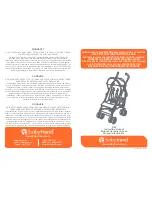
Controller Connections
Instruction Manual
135
Inputs
Description
TASK VERIFY
BIT
When asserted on any input bus, the controller verifies the selected task number is equal to this input’s task
number. Use the BIT parameter under Configuration to select the task number to verify. If there is a mismatch
between the active task and the selected task the tool is disabled. This is one bit of a binary number created by
many of these bits. See SELECT TASK BIT to understand how to use bits to create binary numbers.
When removed verification will not happen.
Size: 1 bit, except on fieldbus where it can be size any size to fit the need.
Configuration:
Contact Type: Normally Open (N.O.), Normally Closed (N.C.)
Bit: Type the number this bit will be in the binary number scheme to verify a task.
Mode: All TASK VERIFY BITs must be the same mode, no mixing of modes allowed.
Binary – Creates a decimal number equivalent to the weighted value of this binary bit(s).
1 – Creates a number equivalent to the weighted value of this binary bit(s) and add the value of one
(1) to that number.
Spindle: Type the spindle number for which the task is to be verified.
* Outputs not available on 24 VDC
6.12.2 Output Descriptions
Each of the output functions has Configuration settings: Contact types, Output types and others. It is recommended
to configure them immediately once the output functions are assigned to a pin.
Contact Type
The Contact Type can be Normally Open (N.O.) or Normally Closed (N.C.).
Sourcing Outputs (PNP type)
If an output’s contact type is normally open and the output is asserted, the output pin transitions from 0V DC to
24V DC. If an output’s contact type is normally closed and the output is asserted, the output pin transitions from
24V DC to 0V DC.
Sinking Outputs (NPN type)
If an output’s contact type is normally open and the output is asserted, the output pin transitions from 24V DC to
0V DC. If an output’s contact type is normally closed and the output is asserted, the output pin transitions from
0V DC to 24V DC.
Output Type
The Output Type defines the behavior of the output signal.
Normal – The output asserts and stays asserted until a reset condition occurs.
Minimum On Time – Keeps the output asserted for this minimum time in seconds, even though a reset condition
occurs. After the timer is finished, the output resets if a reset condition has occurred, otherwise it remains asserted
until a reset condition occurs.
Timed – The output asserts for this period of time, then resets on its own without waiting for the reset condition
to occur.
Time – Units are in seconds.
Flash – The output flashes for as long as it is asserted.
Period – Sets the flashing on and off times, which are equal. Units are in seconds
Spindle – Indicates from which spindle in the multi-spindle system this function comes.
Summary of Contents for QB Expert
Page 8: ......
Page 23: ...Introduction Instruction Manual 15 ...
Page 24: ......
Page 36: ......
Page 37: ...3 QB Expert Alpha Controller Programming SETUP Area SERVICE Area ANALYZE Area ...
Page 94: ......
Page 109: ...Instruction Manual 101 ...
Page 110: ......
Page 123: ...Instruction Manual 115 Tool Operation ...
Page 124: ......
Page 132: ...Input and Output Connector QB Expert Alpha Controller 124 Inputs example ...
Page 133: ...Controller Connections Instruction Manual 125 Outputs Sourcing example ...
Page 157: ...Controller Connections Instruction Manual 149 ...
Page 158: ...MODBUS TCP QB Expert Alpha Controller 150 ...
Page 175: ...Embedded PLC Instruction Manual 167 ...
Page 176: ......
Page 183: ...Multiple Spindle Instruction Manual 175 ...
Page 184: ... QB Expert Alpha Controller 176 ...
Page 201: ...Instruction Manual 193 Maintenance ...
Page 202: ...QB Expert Alpha Controller 194 ...
Page 203: ...10 QB Expert Alpha Controller Appendix A Torsion Compensation Angle Validation ...
Page 206: ......
Page 207: ...11 QB Expert Alpha Controller Glossary ...
Page 210: ......
















































